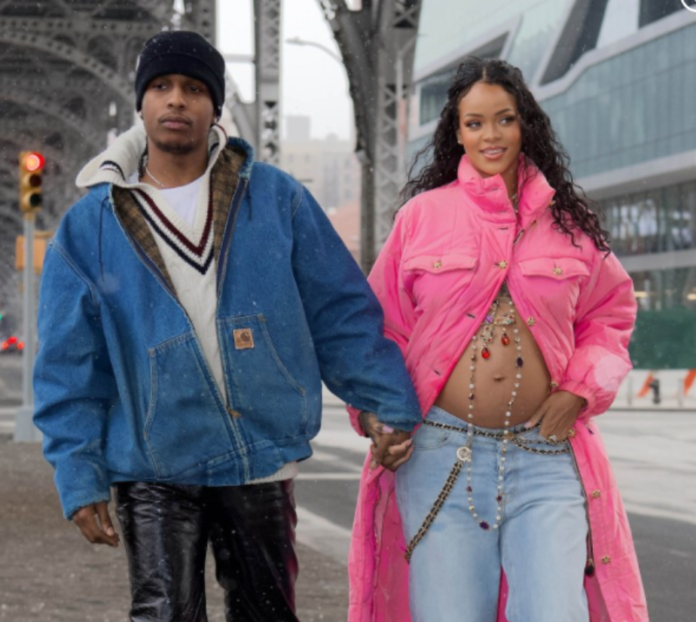She looks beautiful, and the way Rihanna is being celebrated after the announcement of her bundle of joy should be the reality for all Black women. But it’s unusual for America to celebrate a Black woman’s pregnancy.
I can’t help but grapple with a disheartening reality that Malcolm X talked about. He said: “The most disrespected person in America is the Black woman. The most unprotected person in America is the Black woman. The most neglected person in America is the Black woman.”
So as we celebrate this moment with Rihanna, who is also a social justice activist and philanthropist, let’s also continue to amplify the horrors that Black women are facing with maternal health due to racism in this country.
As a new mother myself, being pregnant and giving birth in the height of the pandemic and social unrest was the most challenging moment of my lifetime.
When I found out I was pregnant, I didn’t know if my partner would be able to be with me when I gave birth. I didn’t know if I would have someone who could advocate for my needs. Being able to have a loved one in the room has been a matter of life or death for Black women, due to institutional racism and unconscious biases that centre neglectful practices.
In the summer of 2020, as concerned and outraged citizens across the globe gathered in order to protest against police violence in America, Black people in labour were being stopped on the way to hospitals by police and harassed. I live right in the middle of downtown Baltimore, and I could hear the chants and see the signs of hundreds as they marched down to city hall. After dark, when the protesters went home to restore, the next group of outraged citizens took their suffering to the next level by breaking glass windows of all the surrounding buildings, including the building I live in.
As my due date to give birth was approaching, I had to sit with the fear of all the possible outcomes. I didn’t know if I’d be able to get to the hospital. I didn’t know if I would live through the birth. I didn’t know if I would be leaving with a baby girl in my arms.
My daughter, Reign, was born on Juneteenth, Black people’s independence day, which is now a national holiday. It wasn’t at the time. Juneteenth is the day we commemorate emancipation from slavery.
During labour, I was on the phone with Washington, D.C.’s police chief. I was organising in partnership with community activist Sharon Wise and had planned a peaceful rally and march in D.C. in order to amplify the voices of Ward 8, the city’s ward that has the most African American people and the fewest resources. I didn’t anticipate Reign coming days late and that I would have to induce my labour.
In order to ensure that the rally and march persisted and that my people would be safe and not harassed by police, we took the approach of working with the department and including them in the process. As my labour progressed, I was having trouble breathing. As a Black woman, I had to tell a series of medical professionals: “I can’t breathe.”
The echoes of the phrase in that moment were not lost on me. They gave me oxygen. Then the next nurse on shift would tell me I didn’t need it, and removed my oxygen mask. While pushing out Reign, I nearly fainted. If it had been one more push, I would have passed out.
Doctors believe Black women less when we say we are in pain. I was FaceTiming with my sister and mother, who weren’t allowed in the hospital because of COVID-19. The doctors would tell me I couldn’t do it. They didn’t give a reason. I had to fight for my rights.
They tried to pressure me to have a C-section even though I didn’t need one. The higher percentage of Black women who undergo C-sections compared to white women is one thing. I was experiencing the reality of medical racism. Again, I had to advocate for myself.
My partner, James, was there, and he also advocated for me. We were lucky. It was a shocking reality check. When you are Black, your status, your wealth doesn’t matter. Even having insurance doesn’t change things.
There’s not an argument about it at this point. America doesn’t value the Black woman’s body on equal terms. America doesn’t value the fruit of our bodies, our Black children, on equal terms. Black women are still viewed through racist stereotypes as “welfare baby mommas.” Meanwhile, we are three times likelier than white women to die from pregnancy.
I train young women to run for political office on both sides of the aisle. Many of them say they’re not political when we first meet. But I tell them if they don’t advocate on issues they care about, then decisions get made for them.
When it comes to reproductive justice, we need more women to get elected. Reproductive justice reflects the lives and experiences of Black women, including all of our identities, who have been denied a full range of services and protections, and uses the lens of intersectionality, in order to acknowledge how multiple systems of oppression work together.
Congress, at a minimum, still hasn’t passed paid family leave into law.
So, yes. It is fantastic news that Rihanna is pregnant. We should celebrate it. And we should use symbolism to guide our actions, but not as a measure of achievement. It’s time we make the experience of all Black pregnancies an opportunity for celebration.
*****
Tierra Stewart is Chief Program Officer at IGNITE. It is America’s largest and most diverse organisation for young women’s political leadership.

